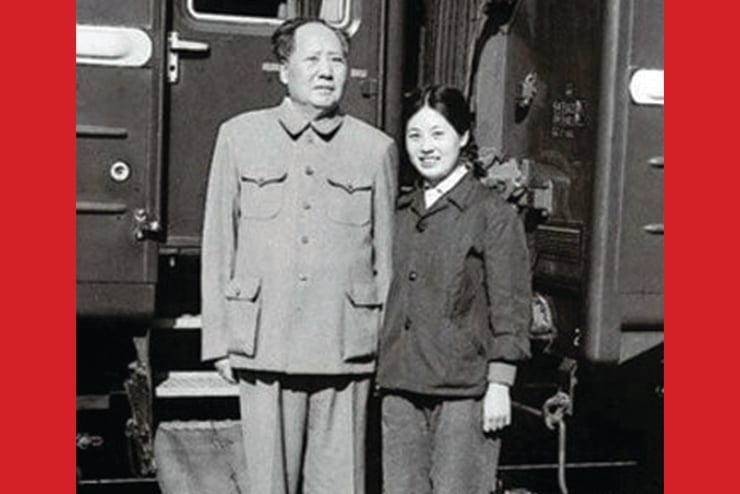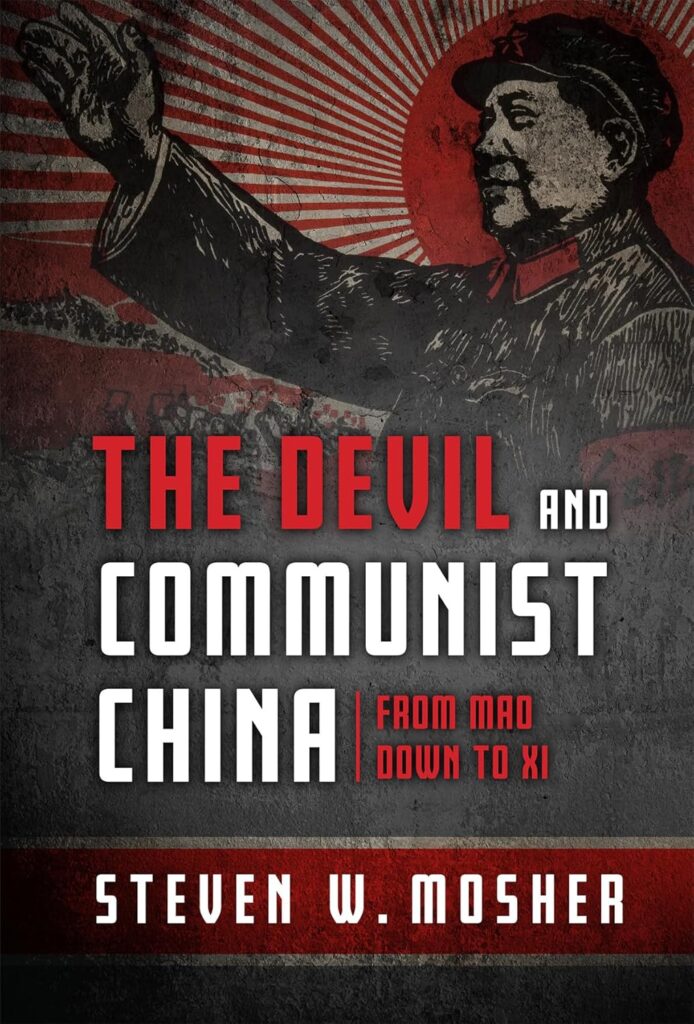by Stephen W. Mosher
TAN Books
283 pp., $29.95
People often use the words “diabolical” or “demonic” when speaking of something that is corrupt or immoral. Mostly, we use those words in an unthinking and non-spiritual way. True evil is understood to be an act against God. But if we believe in God, should we not also believe in the existence of the Devil? What happens when the evil perpetrated against human beings is so vast, so strong, and so dark that the language required to describe it must encompass the existence of the Devil?
Steven W. Mosher’s excellent book, The Devil and Communist China, outlines the truth about the Chinese regime and deserves great attention not merely from a historical point of view but also from a religious one. He focuses mostly on Communism in China, and the millions of deaths this authoritarian regime has brought about, especially under Chairman Mao. Mosher’s approach to tackling such a vast subject is interesting and engaging. It is partly a biography of Mao Zedong, and partly a history of China and the development of Communism. It’s also a memoir of Mosher’s own experience with the country’s barbaric offenses against human dignity.
Communist ideology has brought nothing but evil, darkness, and death throughout its history. Today, it is accepted that the Soviet Union, East Germany, and other Communist countries committed immoral atrocities. China, however, is treated differently by historians and the general population. In fact, Mao’s murderous laws caused around 65 million deaths, although Mosher argues the figure should be counted even higher because “two major campaigns, each producing millions of additional fatalities, must be added to the list.” One of those from 1960 to 1962 was “the worst famine in human history: up to 45 million [dead],” Mosher writes. The second concerns the “400 million tiny victims, both born and unborn, of the CCP’s long-running one-child policy, of which Mao was the godfather.”
Yet many American leftists continue to be seduced by both a Communist ideology and China’s growing economic success. In some cases, Mao has entered into the halls of popular culture as some Warholesque caricature, his strange and seemingly innocently smiling face adorns many t-shirts and flags proudly displayed by the leftist activists. But the truth about the man is far from amusing.
Like most dictators, Mao cared more about his own interests than he did about ideology. Though he developed a taste for Marxism, the ideology was merely a useful means to his authoritarian ends. Mao proclaimed the establishment of the People’s Republic of China in 1949, and from then on, he engaged in every conceivable act to maintain power and control. Killing wasn’t an unfortunate or accidental result of Mao’s obsession with political power, but a desired result. In fact, as Mosher writes, “Mao cautioned against killing [just] a few.” He wanted to make an impact, and anyone who stood in his way was eliminated.
One of Mosher’s goals in the book is to prove that China’s brand of Communism isn’t something that came out of thin air, but rather that it is in the Chinese nature to gravitate toward totalitarianism. Mosher connects the Marxist-Leninist tradition to China’s early rulers and dynasties. “What happened in ancient China went far beyond merely concentrating power in the hands of the sovereign,” he writes. “China’s early rulers were guided in their quest for power by a school of Chinese Machiavellis collectively called Legalists.”
Legalism in China gave rise to various bureaucracies and reforms in order to strengthen the local monarch. We may easily conclude that any monarch has the capability of being a tyrant, but according to Mosher, China’s monarchical system wasn’t ordinary. It attempted to regulate every single aspect of citizens’ lives, and its policy was that “any and all dissent must be crushed without hesitation,” Mosher writes. These features made Chinese monarchy more a totalitarian endeavor than a kingly one. The totalitarian impulse that began with the Qin dynasty “entered China’s cultural DNA and continued to replicate itself down through the centuries and the dynasties,” Mosher writes.
The ruthlessness of China’s dynastic rulers inspired Mao’s own homicidal urges. He merged legalism and Marxism to create his own form of totalitarianism. Although Mao immersed himself in the study of Chinese history, Mosher says he willfully ignored any peaceful principles of Buddhism or the “counsel of Confucian moderation in toto.”
The “culture of death” that Mao pursued in government also characterized his private life. It’s not surprising that a man who had no regard for human life also had no regard for family and marriage, which are fundamental aspects of life that lead to the creation of authentic communities rather than Marxist collectives. Mao was married four times, and as Mosher writes, “all of Mao’s wives came to a bad end.
His first wife was abandoned and died an early death… the second was not only abandoned but executed… the third was locked up in a Soviet insane asylum… the fourth was arrested for political activism that she undertook on Mao’s behalf, and she later killed herself.
Outside of marriage, Mao sexually abused girls so young that the encounters left them infertile and often infected with sexually transmitted diseases. According to Mosher, Mao was obsessed with a pseudoscientific belief that he could extend his lifespan by having sex with as many young girls as possible. Such acts only added to Mao’s long series of crimes against humanity, both as a ruler and a man.
China’s totalitarian state continued in full force after Mao’s death, up to the present day. Mosher sees the post-Mao rulers, including current President Xi Jinping, as cut from the same cloth, particularly in their devotion to China’s longstanding population control measures like the “one-child policy,” which was replaced by a “two-child policy” in 2016, following an incecrease in China’s population. Population control is an essential part of Mao’s totalitarian machine, Mosher writes—Western Marxists and globalists at the World Economic Forum advocate similar dystopian policies. In a 1957 speech, Mao said:
Reproduction needs to be planned… mankind is completely incapable of managing itself. We have plans for production in factories, for producing cloth, tables, and chairs, but no plan for producing humans… We need to have a special government ministry—what about a Planned Birth ministry?
Mao’s campaign against children and reproduction didn’t take shape until 1970. by then, China controlled when people got married, inserting IUDs into women’s bodies and, of course, ordering abortions. Between 1971 and 1979, the Chinese aborted 7.86 million babies and sterilized 5.29 million adults, Mosher writes. “I went with young mothers,” writes Mosher,
to family planning ‘study sessions’ where they were browbeaten by senior party officials for getting pregnant. I followed them as they were unwillingly taken under escort to the commune clinic. I watched—with the permission of local officials who were eager to demonstrate their prowess in planning births to a visiting foreigner—as they were aborted and sterilized against their will.
Mosher goes on to describe medical infanticides of born babies, a horror even more gruesome than the chemical termination of life in the womb.
Such realities are difficult to read, let alone stomach. Nevertheless, as Flannery O’Connor wrote in a letter, “Truth does not change according to our ability to stomach it.” We should feel disgusted when learning such facts, yet there are so many who either make excuses for China’s totalitarian policies, flat-out refuse to acknowledge them, or even worse, see nothing wrong with its population control. It is a perverse way of looking at human life–one that sees no meaning in the past and tradition, does not care about the present, and is obsessed with the theoretical threat of overpopulation. In this joyless Marxist worldview, God does not exist, and individual human life is worthless. Wonder and gratitude are extinguished, as are the possibilities of the human spirit.
“Evil is an unpleasant reality, but Christians can grow in virtue by confronting it,” Mosher writes. “One way to ensure that we are opposed to Satan and his demons is to understand and expose the sins of an evil genius like Mao, and then ask God to empower us to do the opposite.”
Although Mosher does not delve deeply into theology, he does challenge the reader to think about Mao and Communism from a religious perspective. If we accept that the hallmark of Marxist ideology is the rejection of God’s existence, then how can we not think about Mao’s atrocities as unholy?


Leave a Reply